Related Research Articles
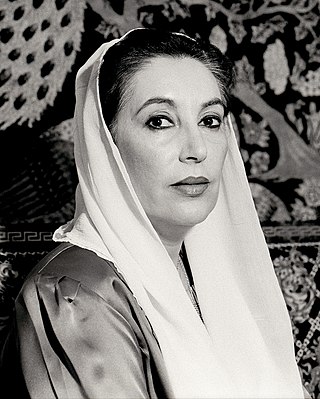
Benazir Bhutto was a Pakistani politician and stateswoman who served as the 11th and 13th prime minister of Pakistan from 1988 to 1990 and again from 1993 to 1996. She was the first woman elected to head a democratic government in a Muslim-majority country. Ideologically a liberal and a secularist, she chaired or co-chaired the Pakistan People's Party (PPP) from the early 1980s until her assassination in 2007.

Muhammad Zia-ul-Haq was a Pakistani military officer who served as the sixth president of Pakistan from 1978 until his death. He also served as the second Chief of Army Staff of the Pakistan Army from 1 March 1976 to 17 August 1988.

Zulfikar Ali Bhutto was a Pakistani barrister, politician and statesman who served as the fourth president of Pakistan from 1971 to 1973, and later as the ninth prime minister of Pakistan from 1973 to 1977. He was the founder of the Pakistan People's Party (PPP) and served as its chairman until his execution.
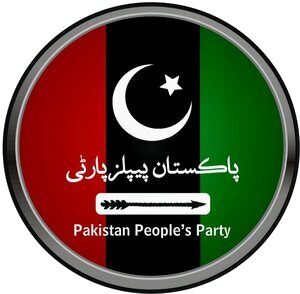
The Pakistan People's Party is a centre-left, social-democratic political party in Pakistan. It is currently the second-largest party in the Senate. The party was founded in 1967 in Lahore, when a number of prominent left-wing politicians in the country joined hands against the military rule of president Muhammad Ayub Khan, under the leadership of Zulfikar Ali Bhutto. It is affiliated with the Socialist International. The PPP's platform was formerly socialist, and its stated priorities continue to include transforming Pakistan into a social-democratic state, promoting egalitarian values, establishing social justice, and maintaining a strong military. The party, alongside the Pakistan Muslim League-Nawaz and the Pakistan Tehreek-e-Insaf, is one of the three largest political parties of Pakistan.

Abdul Qadeer Khan,, known as A. Q. Khan, was a Pakistani nuclear physicist and metallurgical engineer who is colloquially known as the "father of Pakistan's atomic weapons program".

General Mirza Aslam BegNI(M) HI(M) SBt LoM, also known as M. A. Beg, is a retired four-star rank general of the Pakistan Army, who served as the third chief of army staff from 1988 until his retirement in 1991. His appointment as chief of army staff came when his predecessor, President General Muhammad Zia-ul-Haq, died in an air crash on 17 August 1988.
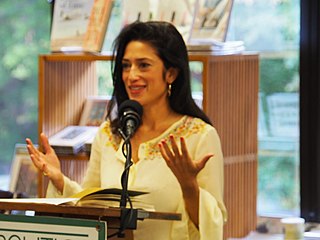
Fatima Bhutto is a Pakistani writer and columnist. Born in Kabul, she is the daughter of politician Murtaza Bhutto, sister of Zulfikar Ali Bhutto Jr, niece of former Pakistani Prime Minister Benazir Bhutto and granddaughter of former Prime Minister and President of Pakistan, Zulfiqar Ali Bhutto. She was raised in Syria and Karachi, and received her bachelor's degree from Barnard College, followed by a master's degree from the SOAS University of London.
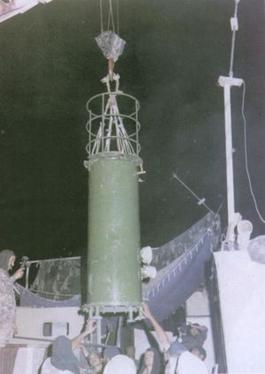
The Pokhran-II tests were a series of five nuclear bomb test explosions conducted by India at the Indian Army's Pokhran Test Range in May 1998. It was the second instance of nuclear testing conducted by India; the first test, code-named Smiling Buddha, was conducted in May 1974.

Ghulam Murtaza Bhutto 18 September 1954 – 20 September 1996) was a Pakistani politician and leader of al-Zulfiqar, a Pakistani left-wing militant organization. The son of Zulfikar Ali Bhutto, the former Prime Minister of Pakistan, he earned a bachelor's degree from Harvard University and a master's degree from the University of Oxford. Murtaza founded al-Zulfiqar after his father was overthrown and executed in 1979 by the military regime of General Zia-ul-Haq. In 1981, he claimed responsibility for the murder of conservative politician Chaudhry Zahoor Elahi, and the hijacking of a Pakistan International Airlines airplane from Karachi, during which a hostage was killed. In exile in Afghanistan, Murtaza was sentenced to death in absentia by a military tribunal.

The Abdali is a land-based supersonic and tactical short-range ballistic missile (SRBM), currently in military service with the strategic command of the Pakistan Army.

Harsh Mander is an Indian author, columnist, researcher, teacher, and social activist who started the Karwan-e-Mohabbat campaign in solidarity with the victims of communal or religiously motivated violence. He is the Director of the Centre for Equity Studies, a research organisation based in New Delhi. He also served as Special Commissioner to the Supreme Court of India in the Right to Food Campaign and was a member of the National Advisory Council of the Government of India, set up under the UPA government.
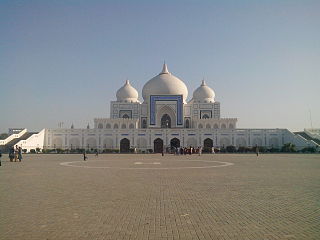
The Bhutto family is a Pakistani political family, based in Sindh. The Bhuttos have played a prominent role in Pakistani politics and government. The family has held the leadership of the Pakistan People's Party (PPP), since its inception in 1967. The Bhuttos have been settled in Sindh for over three centuries.

Pakistan and the United States established relations on 15 August 1947, a day after the independence of Pakistan, when the United States became one of the first nations to recognize Pakistan.
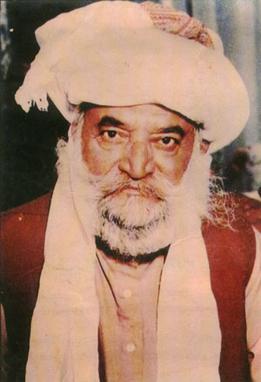
Sher Mohammad Marri was the chief of the Marri Baloch tribe in Pakistan, and an early leader in the Parrari movement which would lead to the formation of the Baloch Liberation Army, a militant nationalist group. A Marxist, he had close ties to leftist governments in Kabul and Moscow.

The Hatf Program was the classified program by the Ministry of Defence (MoD) of Pakistan for the comprehensive research and the development of guided missiles. Initiatives began in 1986–87 that also received support from Prime Minister Benazir Bhutto in a direct response to India's equivalent program in 1989.

Sartaj Aziz is a Pakistani economist and strategist, having previously served as the deputy chairman of the Planning Commission of Pakistan, member of the federal cabinet as the de facto Minister for Foreign Affairs, a Federal Senator as well as the National Security Advisor.
Mubashir Hassan was a Pakistani politician, humanist, political adviser, and an engineer who served in the capacity of Finance Minister in Bhutto administration from 1971 until 1974.

Pakistan and the Soviet Union had complex and tense relations. During the Cold War (1947–1991), Pakistan was a part of Western Bloc of the First World and a close ally of the United States.
Minimum Credible Deterrence is the defence and strategic principle on which the atomic weapons programme of Pakistan is based. This doctrine is not a part of the nuclear doctrine, which is designed for the use of the atomic weapons in a full-scale declared war if the conditions of the doctrine are surpassed. Instead, the policy of the Minimum Credible Deterrence falls under minimal deterrence as an inverse to the Mutually Assured Destruction (MAD), which is widely regarded as designed to dissuade India from taking any military actions against Pakistan, as it did in 1971, when Pakistan started the war. Pakistan refuses to adopt No first use policy, while the other regional powers, India and China, have adopted the policy. Pakistan's foreign minister Shamshad Ahmad had warned that if Pakistan is ever invaded or attacked, it will use "any weapon in its arsenal" to defend itself.
The story of history of the Islamic Republic of Pakistan began on 14 August 1947 when the country came into being in the form of Dominion of Pakistan within the British Commonwealth as the result of Pakistan Movement and the partition of India. While the history of the Pakistani Nation according to the Pakistan government's official chronology started with the Islamic rule over Indian subcontinent by Muhammad bin Qasim which reached its zenith during Mughal Era. In 1947, Pakistan consisted of West Pakistan, East Pakistan and Hyderabad The President of All-India Muslim League and later the Pakistan Muslim League, Muhammad Ali Jinnah became Governor-General while the secretary general of the Muslim League, Liaquat Ali Khan became Prime Minister. The constitution of 1956 made Pakistan an Islamic democratic country.
References
- ↑ "Journalist Shyam Bhatia narrates his experiences – Times of India". Timesofindia.indiatimes.com. 9 August 2018. Retrieved 19 May 2020.
- ↑ "Book Review: Bullets and Bylines- From the frontlines of Kabul, Delhi, Damascus and beyond". Dnaindia.com. 7 February 2016. Retrieved 19 May 2020.
- ↑ "Shyam Bhatia". The Guardian. Retrieved 19 May 2020.
- ↑ "REVIEW: With friends like these..." 27 September 2008.
- ↑ https://www.doonschool.com/wp-content/uploads/2017/10/foundersweekly2017.pdf [ bare URL PDF ]
- ↑ "The media and the truth: OL journalist Shyam Bhatia inspires Sixth Form". Leighton Park. 24 January 2020.
- ↑ "Shyam Bhatia". 15 April 2020.
- ↑ MANDIRA NAYAR in Delhi (30 October 2017). "Shahzadi in nuke storm – Book claims Benazir spilled bomb beans to N. Korea". Telegraphindia.com. Retrieved 19 May 2020.
- ↑ "'For a series of people I must be eliminated' – Indian Express". Archive.indianexpress.com. 28 December 2007. Retrieved 19 May 2020.
- ↑ "Press Awards Winners 1990 - 1999". The Press Awards. Archived from the original on 28 November 2016. Retrieved 14 August 2020.
- ↑ site admin (15 March 1980). "Mixed fare - Society & The Arts News - Issue Date: Mar 15, 1980". Indiatoday.in. Retrieved 19 May 2020.
- ↑ Bhatia, Shyam; McGrory, Daniel (1 April 2000). Brighter Than the Baghdad Sun: Saddam Hussein's Nuclear Threat to the United ... - Shyam Bhatia, Daniel McGrory - Google Books. ISBN 9780895262516 . Retrieved 19 May 2020.
- ↑ "When Raja Ramanna turned down Saddam Hussein - india". Hindustan Times. 30 March 2003. Retrieved 19 May 2020.
- ↑ "Wish I had said no - india". Hindustan Times. 14 June 2008. Retrieved 19 May 2020.
- ↑ "REVIEW: With friends like these..." Dawn.Com. 27 September 2008. Retrieved 19 May 2020.
- ↑ Slater, Jerome (19 May 1991). "Shyam Bhatia, Nuclear Rivals in the Middle East (London: Routledge, 1988). Pp. 119". International Journal of Middle East Studies. 23 (2): 269–270. doi:10.1017/S0020743800056221. S2CID 161368508 – via Cambridge Core.
- ↑ Connect With Us. "Bullets and Bylines: From the Frontlines of Kabul, Delhi, Damascus and Beyond – Speaking Tiger Books Speaking Tiger Books". Speaking Tiger Books . Retrieved 19 May 2020.
- ↑ "Bullets and Bylines by Shyam Bhatia". Free Press Journal.